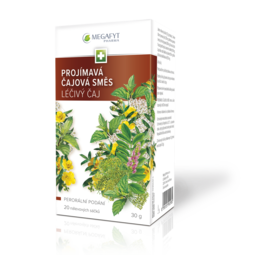Traditional herbal medicinal product
For oral use
Use
Always take this medicine exactly as described in this leaflet or as your doctor or pharmacist has told you. Check with your doctor or pharmacist if you are not sure.
Herbal medicinal product intended for the short-term treatment of functional constipation accompanied by flatulence.
The product has mild anti-inflammatory effects.
Ingredients
in 1 infusion bag:
- Sennae folium (senna leaf) 750 mg
- Menthae piperitae herba (peppermint herb) 300 mg
- Foeniculi dulcis (sweet fennel fruit) 150 mg
- Liquiritiae radix (licorice root) 150 mg
- Millefolii herba (yarrow herb) 150 mg
l
Preparation
Pour 0,25 l of boiling water over 1 infusion bag and leave it to infuse for 10-15 minutes. It must not be boiled. The tea should be drunk warm, unsweetened, once a day, preferably at bedtime. It is usually sufficient to use the medicine two to three times a week.
The infusion is always prepared fresh, immediately before use. The effect occurs in 8 to 12 hours.
Packaging
20 x 1.5 g / with wrapper
Storage
Keep the product out of the reach and sight of children.
Store below 25 °C in the original package in order to protect from moisture.
Caution
The preparation is only intended for short-term use, no longer than one to two weeks. Chronic use of ever-increasing doses can lead to addiction (addiction syndrome), which can cause fluid and electrolyte imbalances.
Administration of the product may cause an imbalance in the level of electrolytes in patients with kidney disorders, so consult a doctor about the use of tea.
If you are using cardiac glycosides (digoxin), antiarrhythmics (medicines against heart rhythm disorders; e.g. amiodarone, verapamil, etc.), diuretics (medicines that increase the production and excretion of urine) or adrenocorticoids, consult your doctor before you start using Laxative Tea Blend.
If you suffer from chronic constipation or other undiagnosed digestive problems (e.g. abdominal pain, nausea, vomiting), consult using the product with your doctor, because these symptoms may be a sign of a serious medical problem (intestinal obstruction).
The product should only be used if it is not possible to improve the difficulties by changing lifestyle (change in eating habits, i.e. intake of more fiber and fluids; increase in physical activity).
In patients suffering from bowel incontinence (inability to hold stool) need to change sanitary napkins more often to avoid excessive skin contact with stool.
During the use of the product, the urine color change (yellow or reddish-brown color, depending on the pH value) may occur, but this is not clinically significant and will disappear spontaneously.
Long-term use can cause pigmentation (coloring) of the intestinal mucosa (pseudomelanosis coli), which usually subsides after discontinuation of the product.
If any unusual reactions occur, stop using the product and consult a doctor.
Do not use after the expiration date stated on the package.
Return the unused drug back to the pharmacy.
Interaction
Long-term use of the product can decrease the level of potassium in the blood, which can cause increase effect of cardiac glycosides and affect the effect of drugs against heart rhythm disorders, drugs that cause sinus rhythm reversion (e.g. quinidine) and drugs that cause prolongation the QT-interval.
Concomitant use of corticoids and diuretics and licorice may increase this electrolyte imbalance. Any negative effect of licorice contained in the herbal infusion can be suppressed by increased intake of potassium. Concomitant use of Sennae folium with these preparations should be consulted with a doctor beforehand.
Side effects
Very rare, the product can cause skin reactions (itching, hives, redness of the skin).
The product may cause crampy abdominal pain and watery stools, especially in patients with irritable bowel syndrome. However, these symptoms also occur in overdose. In these cases, it is necessary to reduce the dose.
With long-term use (or overdose), diarrhea occurs, which leads to excessive loss of water and minerals (especially potassium), which can cause, for example, circulatory or heart disorders.
Chronic use of high doses can cause toxic inflammation of the liver.

 Herbal medicinal products
Herbal medicinal products  Herbal Pharmacy
Herbal Pharmacy Children´s teas
Children´s teas Fruit and other teas
Fruit and other teas Wellbeing
Wellbeing Limited edition
Limited edition

 Facebook
Facebook Instagram
Instagram